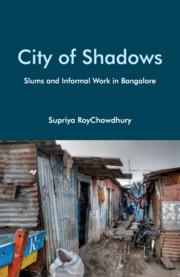Book contents
- Frontmatter
- Contents
- List of Tables
- Acknowledgements
- 1 Introduction
- 2 Welfare and Work: State Autonomy Revisited
- 3 Urban Poverty and Informal Work
- 4 A Political Economy Overview: Karnataka and Bangalore
- 5 New Slums: Migration, Livelihoods and Living
- 6 Old Slums
- 7 Impact of Slum Housing Policies: Bangalore’s New Ghettoes
- 8 Women Workers in Bangalore’s Garment Export Companies
- 9 Conclusion
- Index
9 - Conclusion
Published online by Cambridge University Press: 31 July 2021
- Frontmatter
- Contents
- List of Tables
- Acknowledgements
- 1 Introduction
- 2 Welfare and Work: State Autonomy Revisited
- 3 Urban Poverty and Informal Work
- 4 A Political Economy Overview: Karnataka and Bangalore
- 5 New Slums: Migration, Livelihoods and Living
- 6 Old Slums
- 7 Impact of Slum Housing Policies: Bangalore’s New Ghettoes
- 8 Women Workers in Bangalore’s Garment Export Companies
- 9 Conclusion
- Index
Summary
The dualities in the developmental trajectories of cities of the Global South have drawn much attention. Critical debates have been generated on processes which had earlier been assumed to be part of the normal stages in development. I highlight two themes here briefly: migration and technology. The positive links between migration, urbanisation and development shaped modernisation theory in the 1950s, advocating the replication of the western industrialisation/urbanisation model to developing countries. Modernisation theory, hegemonic for a long time, has perhaps been officially discarded in the social sciences. Nevertheless, the image of industrially advanced nations, which are predominantly urban societies in which the erstwhile rural communities became fully integrated into the structure of cities, continues to fuel the imagination of policymakers as well as development scholars and practitioners, located both in the west and in developing countries like India. On the other hand, continuing processes of cyclical movement of migrant labour have been seen to challenge the classical approaches linking migration and development. Patterns of circular migration suggest that points of rural origin left behind continue to provide, at least partially, not only the sustenance of those who stay back but also the security of those who migrate (discussed in Chapter 3), thus disrupting the universality/uniformity message of migration/ urbanisation theories. Nothing has illustrated this more than the massive exodus of migrant labour from cities in India back to their villages during the recent pandemic of 2020.
The issue of migration is closely linked to changing technologies of production and shifts in the structure of urban labour markets. Saskia Sassen, in her landmark work on global cities, underlined the proliferation of sweatshops in exploiting undocumented immigrant workers. Her broader point was that ‘even the most dynamic and technologically developed sectors of the economy generate jobs that can conceivably be held by unskilled foreign language workers’ (Sassen 2005). She highlighted the massive arrival of immigrants from low-wage countries to global cities of the west. Cities in the Global South too have recreated that space of exploitation, as a middle and upper class of professionals greatly benefit from the technologically driven wealth generation of globally connected cities like Bangalore and New Delhi while simultaneously a low-paid class of service providers, most often migrants from rural areas, appear as housekeepers and nannies, watchmen and waiters, drivers and app-based delivery boys.
- Type
- Chapter
- Information
- City of ShadowsSlums and Informal Work in Bangalore, pp. 201 - 219Publisher: Cambridge University PressPrint publication year: 2021



